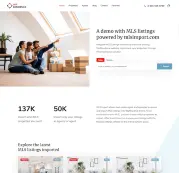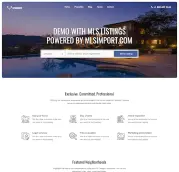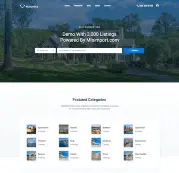The Real Estate Standards Organization (RESO) is a non-profit organization dedicated to creating and promoting data standards in the real estate industry. One of the main goals of RESO is to improve the efficiency and accuracy of data transfer between multiple listing services (MLS) and other real estate technology systems.
As a result, the organization has developed a set of standards known as RESO Data Dictionary, designed to facilitate data interoperability between different MLS systems. If you don’t know is an MLS system is, you can check this article, where we explain what MLS is in Real Estate and some additional explanations.
Can you get MLS in Canada?
Yes, it is possible to access MLS listings in Canada. However, to access the full range of listings and data on a particular MLS system, you must be a licensed real estate professional and a member of the relevant real estate board or association.
For example, to access TREB MLS in Toronto, you must be a licensed real estate professional and a Toronto Real Estate Board member. Similarly, to access REBGV MLS in Vancouver, you must be a licensed real estate professional and a Greater Vancouver Real Estate Board member.
In Canada, many MLS systems have adopted RESO standards and are considered RESO-ready. This means that the systems have implemented the RESO Data Dictionary and can share data with other RESO-compliant systems seamlessly.
This is a significant advantage for Canadian real estate professionals, as it allows them to access a wider pool of properties and data, which can help them serve their clients better.
One of the critical benefits of RESO-compliant MLS systems is that they enable real estate professionals to access accurate and up-to-date property information from multiple sources.
It also can help agents and brokers to make better-informed decisions and provide more accurate information to their clients. Additionally, RESO-compliant systems can help to reduce data entry errors, which can save time and improve the overall efficiency of the real estate industry.
Another benefit of IDX / RESO-compliant MLS systems is that they can make it easier for real estate professionals to share data with other industry stakeholders, such as mortgage lenders, title companies, and government agencies. This can streamline the buying and selling process and make it easier for real estate professionals to provide a better service to their clients.
If you are unfamiliar with all these concepts, this article, titled ‘What Is IDX (Internet Data Exchange) – The Complete Guide‘, breaks down how IDX can change the real estate world.
What are the most well-known MLS in Canada?
There are several well-known MLS systems in Canada. Some of the most notable include:
- Association of Interior Realtors MLS: This MLS is located in Kelowna and serves the Okanagan, Kamloops, Kootenay, and Peace River areas.
- Edmonton MLS (Multiple Listing Service): serves Edmonton, Alberta, Canada, and the surrounding areas
- Real Estate Board of Greater Vancouver (REBGV) MLS: This MLS system serves the greater Vancouver area, including Vancouver, Burnaby, and Richmond.
- Canadian Real Estate Association (CREA) MLS: This national MLS system provides access to properties and data across Canada. CREA MLS is a member-based organization, and its members include real estate boards and associations from across the country.
- Fraser Valley Real Estate Board (FVREB) MLS: This MLS system serves the Fraser Valley area, including Abbotsford, Chilliwack, and Mission.
- Real Estate Board of Greater Hamilton-Burlington (REBGHB) MLS: This MLS serves the greater Hamilton-Burlington area, including the cities of Hamilton, Burlington, and Ancaster.
These are just a few examples of the many MLS systems in Canada. Each MLS system serves a specific region or area, offering different features, services, and data. Therefore, it’s always best to check the most appropriate for your needs and location.
RESO-compliant MLS systems are a valuable resource for Canadian real estate professionals. They provide access to accurate and up-to-date property information, which can help agents and brokers make better-informed decisions and serve their clients better.
Additionally, RESO-compliant systems can help reduce data entry errors and improve the overall efficiency of the real estate industry. Therefore, adopting RESO standards by MLS in Canada is a step towards better and more efficient service for the industry and clients.
How can you build a website with MLS Listings from Canada
MLSimport.com enables real estate agents and brokerages to import property listings from multiple listing services (MLS) into their websites. It’s not specific to a particular country and can import listings from many MLS systems, including Canada.
However, to import listings from a particular MLS system, you typically need to be a licensed real estate professional and a member of the relevant real estate board or association.
Additionally, it’s essential to check that the MLS system you want to import listings from is compatible with MLSimport.com and that you have the necessary permissions from the MLS system.
It’s always recommended to check their website or contact the MLSimport support team to confirm that the MLS you are interested in is compatible with the software.
Are there any fees associated with using the MLS system for buyers or sellers in Canada?
In Canada, only real estate agents typically have access to the MLS system, and they pay a fee to be a member of their local real estate board, which grants them access to the MLS.
The MLS system’s cost is typically built into the commission that the seller pays the listing agent when the property is sold. However, some provinces, like British Columbia, Alberta, and Ontario, have started to allow sellers to list their property on the MLS without an agent and still pay a flat fee to use the service.
Buyers are not typically charged a fee to use the MLS system, but some agents may charge a buyer representation fee for their services.
Are there any differences in the MLS system between provinces or territories in Canada?
Yes, there are some differences in the MLS system between provinces and territories in Canada. Each province and territory has its real estate board and MLS system, which may have different rules, regulations, and fees.
In British Columbia, the Real Estate Board of Greater Vancouver (REBGV) operates the MLS system for the Greater Vancouver area while the Fraser Valley Real Estate Board (FVREB) covers the Fraser Valley area.
In Alberta, the Calgary Real Estate Board (CREB) and the Edmonton Real Estate Board (EREB) operate the MLS systems for their respective cities.
In Ontario, the Toronto Real Estate Board (TREB) operates the MLS system for the Greater Toronto area. The Oakville-Milton Real Estate Board (OMREB) covers Oakville and Milton.
Additionally, some provinces have different rules and regulations regarding the use of the MLS systems: Ontario has implemented new rules that allow sellers to list their property on the MLS without an agent and pay a flat fee to use the service.
In other provinces like Quebec, it’s mandatory to use a real estate agent to list a property on the MLS.
While there are differences in the MLS system between provinces and territories, they all share the same purpose: to provide an organized and centralized platform for real estate agents to list and search for properties.
Can foreign buyers access the Canadian MLS system to search for properties?
Yes, foreign buyers can access the Canadian MLS system to search for properties. Still, they typically need to work with a Canadian real estate agent who is a local real estate board member and has access to the MLS.
The real estate agent can assist foreign buyers in searching for properties, providing information about the Canadian real estate market, and helping them navigate the legal and financial aspects of buying property in Canada.
It’s important to note that foreign buyers may face additional challenges and regulations when buying property in Canada. For example, they may need to obtain a mortgage from a Canadian lender. They may face stricter lending requirements. Also, they may be subject to additional taxes, such as the Non-Resident Speculation Tax in Ontario.
Foreign buyers should seek the guidance of a professional real estate agent who can assist them in navigating the Canadian real estate market and help them find properties that meet their needs.
Can I list my property on the MLS if I sell it privately?
In some provinces like British Columbia, Alberta, and Ontario, a private seller can list their property on the MLS without using a real estate agent. Still, this is not the case in all provinces across Canada.
In these areas, private sellers can pay a flat fee to a real estate brokerage to list their property on the MLS but will not be represented by an agent in the sale process and will have to handle negotiations and paperwork on their own. The brokerage will only provide the service of listing the property on the MLS.
In provinces like Quebec, it is mandatory to use a real estate agent to list a property on the MLS.
While listing a property on the MLS can increase visibility and reach a wider audience, it also comes with specific responsibilities and legal requirements that private sellers should be aware of before taking this route. It is advisable to consider all options, including listing with an agent, before listing your property.
Table of Contents





